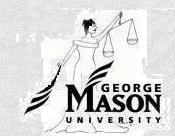|
Mary Jane McIlwain
Complementarity, Synthesis |
 |
Home Collaboration, and Overlay |
|
|||||||||||
| Vitae | Goal Statements | Coursework | Analytical Thinking | Professional Experiences | Research & Dissertation Planning | Documentation of Academic & Professional Growth | |||||
| Projects | Literature Review | Forming Questions | HSRB | Research Design | Data Collection | Data Analysis | Conclusions and Implications |
| The Influence of Teacher Inquiry on Teacher Efficacy |
Study by Study
 |
 |
|||||
| The Influence of Teacher Inquiry on Teacher Efficacy and Collective Efficacy (Quantitative) |  |
Quasi-experimental | |||||
| The Influence of Teacher Inquiry on Teacher Efficacy and Collective Efficacy (Qualitative) |  |
Grounded Theory | |||||
| Action Research: Methodology, Method, and Professional Development | Integrative |
| Projects | Literature Review | Forming Questions | HSRB | Research Design | Data Collection | Data Analysis | Conclusions and Implications |
| DRA and the Standards of Learning Test: Linking Authentic Assessments to High Stakes Testing | Correlational |
Scores |
ANOVA, Regressions
 |
||||
| Oral Language and Phonological Awareness |
Integrative |
||||||
| Oral Language and Literacy Acquisition |
Integrative
 |
||||||
| Discovering Phonological Awareness through Ourselves and Others | Re framing Questions |
Grounded Theory |
Journals |
Open/Axial Coding; CCA |
| Projects | Literature Review | Forming Questions | HSRB | Research Design | Data Collection | Data Analysis | Conclusions and Implications |
| Choice and Voice Lead to Increased Engagement and Achievement | - |  |
- |  Mixed Mehods |
 Survey Interview |
 Survey (Quant) |
- |
| Professional Learning Communities, Professional Development, and Student Achievement |  Study by Study |
 |
- |  Mixed Methods |
- | - | - |
| Vocabulary, Syntax, Discourse, and Phonemic Awareness | - |  |
- |  Mixed Methods Validity Threats |
- | - | - |
| School Improvement Plan Survey | - | - | - | - |  Survey |
 Survey (Quant/Qual) |
- |
| Group Differences in Emergent Literacy Skills | - |  |
- |  Quantitative SEM |
- |  SEM |
- |
| Projects | Literature Review | Forming Questions | HSRB | Research Design | Data Collection | Data Analysis | Conclusions & Implications |
| Students to Students: Storybook Buddy Reading HSRB Application |  |
 |
 |
 |
 |
 |
 |
| Job Embedded Professional Learning for Graduate Credit |  |
 |
 |
 |
 |
 |
 |
| Book Blogs, Reading Engagement, and Academic Identity |  |
 |
- |
 |
 |
 |
 |